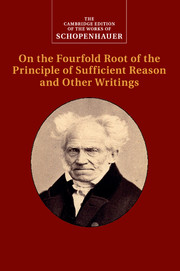Book contents
- Frontmatter
- Contents
- General Editor’s Preface
- Editorial Notes and References
- Introduction
- Notes on Text and Translation
- Chronology
- Bibliography
- Collation of the Two Editions of On the Fourfold Root
- 1 On the Fourfold Root of the Principle of Sufficient Reason
- 2 On Vision and Colours
- 3 On Will in Nature
- Glossary of Names
- Index
Linguistics
Published online by Cambridge University Press: 30 June 2022
- Frontmatter
- Contents
- General Editor’s Preface
- Editorial Notes and References
- Introduction
- Notes on Text and Translation
- Chronology
- Bibliography
- Collation of the Two Editions of On the Fourfold Root
- 1 On the Fourfold Root of the Principle of Sufficient Reason
- 2 On Vision and Colours
- 3 On Will in Nature
- Glossary of Names
- Index
Summary
Under this heading I havemerely to report an observation that I havemade myself in recent years, one that appears to have escaped notice previously. However, Seneca's dictum provides evidence that my observation is worth considering: ‘the suitability of expression for many things is astonishing, and the use of language handed down from the ancients expresses many things effectively’, Epistle 81. And Lichtenberg says: ‘if one thinks much oneself, then one will find much wisdom carried in language. Obviously, one does not introduce everything oneself, but much wisdom lies in language.’
In very many, perhaps in all languages, the action of bodies without cognition, even inanimate ones, is expressed by willing; thus, a will is attributed to them from the outset; however, cognizing, representing, perceiving, thinking is never attributed to them: I know of no expression which might contain any of these.
Thus Seneca says (Quaestiones Naturales II, 24) of the fire of lightning hurled down from above: ‘It is for fire, as for trees, whose supple crowns can be pulled down so far that they even touch the ground; but when you let them loose, they spring back to their own place. It is therefore not fitting to have in mind for a thing a position not in accordance with its will. If fire is allowed to go where it will, it goes back to the sky.’ In a more general sense, Pliny says: ‘in any part of nature, not reason, but will, is to be sought’, Natural History, 37, 15. We have no fewer examples from Greek: Aristotle, in explaining gravity, says: (On the Heavens ii, ch. 13) ‘a particle of earth, raised in the air and let loose, moves and wills not to remain.’ And in the following chapter: ‘But one must say of a thing, that it is as it wills according to its nature, but it is not what it is by force and contrary to its nature.’ It is very significant, and it is much more than mere linguistic significance, that where the topic is expressly about inanimate entities (fire, which strives upward and earth which strives downward) as well as about animals, Aristotle says in the Great Ethics I, ch. 14, that they ‘could not be compelled to do something against their nature or against their will’ – thus he quite correctly puts ‘against nature’e as a paraphrase of ‘against their will’.
Information
- Type
- Chapter
- Information
- Schopenhauer: On the Fourfold Root of the Principle of Sufficient Reason and Other Writings , pp. 401 - 404Publisher: Cambridge University PressPrint publication year: 2012
